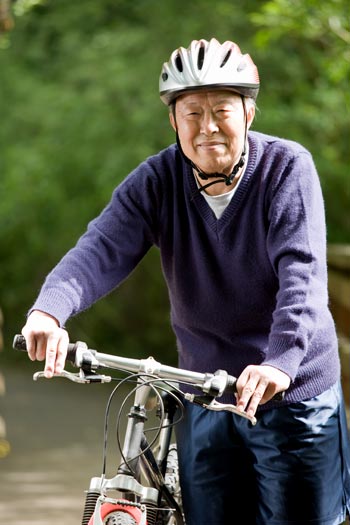Exercise to improve depression
It has long been known that regular exercise is good for our physical health. It can reduce the risk of cancer, heart disease and strokes.
In recent years, studies have shown that regular physical activity also has benefits for mental health. Exercise can help people recover from depression and prevent them from becoming depressed in the first place.

Dr Alan Cohen, a GP with a special interest in mental health, says that when people get depressed or anxious, they often feel they’re not in control of their lives.
Exercise gives them back control of their bodies and this is often the first step to feeling in control of other events.”
Who can benefit and what type of exercise is best?
Anyone with depression can benefit from doing regular exercise, but it’s especially useful for people with mild depression.
Any type of exercise is useful as long as it suits you and you do enough of it,” says Dr Cohen. “Exercise should be something you enjoy. Otherwise it will be hard to find the motivation to do it regularly.”
How often do you need to exercise?
All adults benefit from at least 30 minutes of moderate-intensity activity each day. This exercise does not have to be done all at once, you can break it down into sessions of at least 10 minutes. Find out more:
If you haven’t exercised for a while, gradually introduce physical activity into your daily routine. Even a 15-minute walk can help you clear your mind and relax. Any exercise is better than none!
How to get started
Take part in a team sport, attend classes at a sports centre or just be more active in your daily routine by walking or cycling instead of travelling by car.
Find an activity you can do regularly. For more ideas on different types of exercise and the benefits of being more active, see our fitness section.
To find local exercise classes and sports clubs, search the sport and fitness directory.
If conservation work appeals to you, look at the Green Gym website. Green Gym projects, run in association with The Conservation Volunteers (TCV), provide exercise for people who don’t like the idea of a sports or leisure centre. A typical project involves working in local woodlands or creating community gardens. Sessions are free and led by a TCV member of staff.
If you’re desk-bound at work or study most days:
- Keep your walking shoes handy and be active whenever you have the chance.
- Set a recurring alarm to do some stretches every hour or so.
- Park your car a few blocks from work.
- Get off the bus or train at the stop beforehand and walk.
- Take the stairs instead of the lift.
- Walk up the escalator instead of standing still.
- Walk the longer way around to the photocopier, printer or fax machine.
- Enjoy a walk during your lunch break or team up with a friend to walk after work.
- Walk to your colleague’s office instead of sending an e-mail.
When you’re at home
- Walk around while you’re talking on your phone.
- Do some gentle stretches or sit-ups while watching TV.
- Use TV ad breaks as a chance to do some household chores like washing dishes or folding clothes.
- Do some energetic house-cleaning, gardening or odd jobs on the weekend.
- Park the car further away when going to the supermarket.
Have fun and get fit with some regular, vigorous activity
You don’t have to be an athlete to boost your fitness. Try individual sports such as jogging, swimming laps or riding your bike. You can also get social and join a team sport like touch football, or join a walking group.
Exercise on prescription
If you haven’t exercised for a long time or are concerned about the effects of exercise on your health, ask your GP about the exercise on prescription programme. Many GP surgeries across the country prescribe exercise as a treatment for a range of conditions, including depression.
Your GP will refer you to a local active health team for a fixed number of sessions under the supervision of a qualified trainer.
You decide with your GP and the active health team what type of activity will suit you. Depending on your circumstances and what’s available locally, the exercise programme may be offered free or at a reduced cost.
Further help and information
Many treatments are available for depression, including talking therapies, antidepressant medication and self-help of various kinds. Find out more about treatment for depression.
If you’ve been feeling down for more than two weeks, see your GP to discuss your symptoms. They can tell you about the choice of treatment available for depression and help you decide what’s best for you.
5 steps to mental wellbeing
This page is part of a series called the five steps for mental wellbeing. There are other steps we can all take to improve our mental wellbeing. Check out the other pages in this series:


Leave a reply